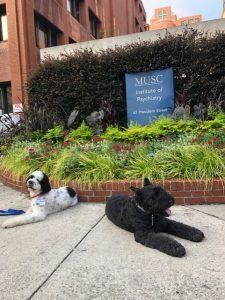News
MUSC Pet Therapy Study Released
Press Release
Holly-Ann Boyle, recreational therapist at MUSC’s Inpatient Child/Adolescent Psychiatric Unit, teamed up with MUSC’s own Pet Therapy program led by program coordinator Cathy Bennett and ambulatory administrative fellow Elizabeth Baer, to study the impacts of pet therapy on the therapeutic environment within the inpatient milieu. Pet therapy programming was introduced to the patients over a four-month time frame with the purpose of facilitating a healing environment, reducing stress, and improving the patient experience. The results from the study are in and are considered promising.
The team consisted of both visiting therapy dogs and their handler, who are all volunteers at MUSC. These teams worked together to visit the child and adolescent units twice a week to work on clinical goals, such as sequencing, stress management, impulse control, communication skills, social, skills and anxiety reduction. This team consisted of:
- Pete, a Portuguese Waterdog, and his handler Pennye Hallam
- Arista, a Bouvier De Flandres, and her handler Charles Eggleton
- Charlie Charizard, a Great Pyrenees, and his handler Vicki Brumbelow
- Cookie, a Golden Retriever, and her handler Arlene Barton
The children on the unit were thrilled to visit with the dogs and would be observed smiling and happily interacting in the session. Patients would often share stories about the pets that they miss at home. Staff members reported a significant improvement of their perception of the therapeutic environment. This perception was confirmed by a reduction in aggressive behavioral incidents that would often result in restraint and seclusion. The study was recently accepted into the Children’s Hospital Associations Annual Leadership Conference where Elizabeth and Holly-Ann will present their findings via a poster presentation and further discuss the applications of Pet Therapy as a therapeutic intervention for acute care psychiatric settings.
The benefits have not only affected the patients, but many of the staff and volunteer handlers have experienced the benefits and comfort of the “paw patrol.” They were often seen warmly greeting and seeking time with the dogs. Many of the volunteers have sought out additional ways to therapeutically serve with their dog from working with physical therapy, supporting veterans, and helping children complete 1:1 patient goals on the inpatient psychiatric unit. One of the handlers is even seeking out a change in career to social work to further assist patients.
It is clear that the therapeutic benefits and comfort that this wonderful department provides is boundless. The Pet Therapy program has helped to combat stigma surrounding mental health and continues to be a huge asset for all of the inpatient units throughout the Institute of Psychiatry.

























